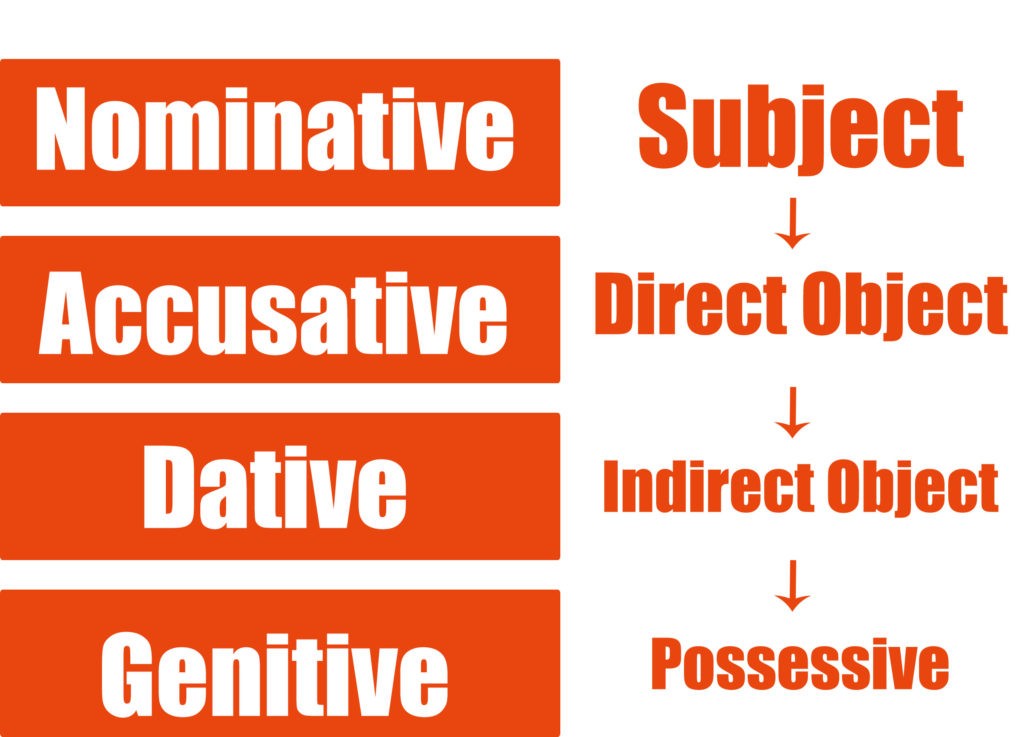
German has four cases that include the nominative, accusative, dative, and genitive. But what do they mean, and how should you know which one to use when? This beginner’s guide introduces you to German cases and helps you understand the concept behind this unusual grammar topic.
As English speakers, the idea of German cases may sound confusing and frightening, but they’re easier to handle than you might think. In addition, German cases give you the flexibility to structure sentences in any order you please. Talk about a language perk!
There’s just one catch; you’ll get to put your knowledge of sentence subjects, direct objects, and indirect objects to the test. You’ll need to understand how these grammatical elements work to assign the correct cases to your German words. Luckily, the German cases are simpler to learn than you’d expect.
Table of Contents
- The English Cases vs. the German Cases
- The Case System and the 4 Different German Cases
- Final Thoughts
Eyes tired of reading? Watch the video of this article instead.
The English Cases vs. the German Cases
Before diving into the case system details, it’s essential to learn the names of each part of a sentence. Let’s look at an example in German and identify its grammatical components.
English Example: Our friend (subject) gave (verb) us (indirect object) a key (direct object) to his brother’s house (prepositional phrase).
German Example: Unser Freund (subject) gab (verb) uns (indirect object) einen Schlȕssel (direct object) zum Haus seines Bruders (possessive object/prepositional phrase).
In English, you probably don’t think about the labels of every word in your sentences, so a reminder can be helpful when learning German grammar. Next, let’s see how each element of the sentence corresponds to a German case.
| German Case Equivalent | Sentence Element |
| (Subject) Nominative Case | Our friend Unser Freund |
| (Direct Object) Accusative | a key einen Schlȕssel |
| (Indirect Object) Dative | us uns |
| (Possessive Object) Genitive | his brother’s seines Bruders |
Usually, in English, you use word order to indicate who is doing what in a sentence. On the other hand, German uses cases, allowing you to place nouns in different positions throughout the sentence without changing the meaning.
The Case System and the 4 Different German Cases
The German nominative, accusative, dative, and genitive cases are a fundamental part of German grammar. Once you understand the cases, you can determine which pronouns, definite or indefinite articles, and adjective endings are appropriate.
For example, in English, “she” and “her” mean the same thing, but you use them in different situations, depending on what sounds right. The same concept applies in German, but until you know what “feels” right, the grammar rules help you decide which form to choose.
In the above table, you can see how the sentence subject takes the nominative case. Likewise, direct objects take the accusative case, and indirect objects take the dative case. Finally, possessive objects take the genitive case. These cases apply to the nouns themselves, endings, and modifiers, such as adjectives and determiners (“the,” “a,” and “an”). Next, let’s look at each case in detail, what it is, and how to identify it.
The Nominative Case
Sentence subjects take the nominative case in German. You can identify the sentence subject by asking who (wer?) or what (was?) is performing the verb. First, let’s look at examples of the nominative case and subjects in a sentence.
Example 1: Wir sind da! (We’re there!)
Example 2: Kennst du ihn? (Do you know him?)
Example 3: Das Haus is gelb. (The house is yellow.)
Example 4: Eine Katze kommt. (A cat is coming.)
Example 5: Sein Buch fehlt. (His book is missing.)
Usually, sentence subjects come at the sentence’s beginning in English or after helping words like “a,” “the,” “his/her,” “do,” etc. In German, these helping words and sometimes the nouns have different forms depending on the case. Below, you’ll find a table with the definite and indefinite articles for the nominative case.
| Nominative: Who? (Wer) or What? (Was) | Masculine Nouns | Feminine Nouns | Neuter Nouns | Plural Nouns |
| Definite Article “the” | der | die | das | die |
| Indefinite Article “a” or “an” | ein | eine | ein | keine (none) |
Remember that German nouns have one of three genders: masculine, feminine, or neuter.
Next, let’s have a look at the nominative case pronouns.
| Personal Pronoun | Nominative Case |
| I | ich |
| You (formal) | Sie |
| You (informal) | du |
| You (plural) | ihr |
| He | er |
| She | sie |
| It | es |
| We | wir |
| They | sie |
You can learn more about How to Use German Pronouns in my other post.
Selecting the correct article to go with your noun means that you must know both the case and gender of a word. Unfortunately, you can’t get away with just one or the other. German cases and genders are highly codependent. If you haven’t already started learning the gender of new German vocabulary, it’s essential to start immediately.
The Accusative Case
Use the accusative case for direct objects in a sentence. Typically, direct objects are things the subject is acting upon and answers the question “who” or “whom.” In German, use “wen” in place of “who” in the accusative case.
Example 1: Ich mag dich. (I like you.)
Example 2: Er hat einen Stein. (He has a stone.)
Example 3: Sie nimmt das Brot. (She takes the bread.)
Example 4: Wen hast du getroffen? (Who did you meet?)
Example 5: Wir haben ihn getroffen. (We met him.)
Now, let’s see how the definite and indefinite articles change in the accusative case.
| Accusative: Who? (Wen) or What? (Was) | Masculine Nouns | Feminine Nouns | Neuter Nouns | Plural Nouns |
| Definite Article “the” | den | die | das | die |
| Indefinite Article “a” or “an” | einen | eine | ein | keine (none) |
Only the masculine noun articles change in the accusative case. Meanwhile, the feminine, neuter, and plural articles remain the same as in the nominative case. That means you only need to memorize two more forms, and we’re already halfway through!
Next, let’s see how the personal pronouns change in the accusative case.
| Personal Pronoun | Accusative Case |
| I | mich |
| You (formal) | Sie |
| You (informal) | dich |
| You (plural) | euch |
| He | ihn |
| She | sie |
| It | es |
| We | uns |
| They | sie |
Finally, there’s one more aspect of the accusative case that requires clarification: accusative prepositions.
Accusative Prepositions in German
You’ll need to watch out for prepositional phrases that also take the accusative case in German. Prepositions signaling the accusative include:
- durch – (through) Wir fahren durch den Wald. (We drive through the forest.)
- fȕr – (for) Ich kaufe Socken fȕr dich. (I’m buying socks for you.)
- ohne – (without) Er kam an, ohne einen Tisch reserviert zu haben. (He arrived without having booked a table.)
- gegen – (against) Wir gehen gegen den Uhrzeigersinn. (We’re going counterclockwise.)
- um – (around) Der Laden ist um die Ecke. (The shop is around the corner.)
Accusative articles, pronouns, and adjective endings always follow these five accusative prepositions.
The Dative Case
The dative case identifies the indirect object of a sentence or the person/thing receiving an action from the subject via the direct object. In most cases, you must have a direct object to have an indirect object because the indirect object cannot stand alone in a sentence.
Example 1: Ich backe ihr einen Kuchen. (I bake her a cake.)
Example 2: Er malt ihnen ein Bild. (He paints them a picture.)
Example 3: Sie haben uns Besteck geschenkt. (The gifted us silverware/cutlery.)
Example 4: Du leihst mir das Auto. (You loan me the car.)
Example 5: Wir geben ihm die Anweisungen. (We give him the instructions.)
Next, I’ll show you how the definite and indefinite articles change in the dative case.
| Dative: Whom? (Wem) or What? (Was) | Masculine Nouns | Feminine Nouns | Neuter Nouns | Plural Nouns |
| Definite Article “the” | dem | der | dem | den |
| Indefinite Article “a” or “an” | einem | einer | einem | keinen (none) |
In the German dative case, the masculine and neuter forms are the same, and the feminine form is the same as the masculine nominative case. Meanwhile, the plural forms resemble the masculine accusative case. These correlations can help you memorize the different case forms in the beginning until they become second nature.
Now, it’s time to look at the dative personal pronouns.
| Personal Pronoun | Dative Case |
| I | mir |
| You (formal) | Ihnen |
| You (informal) | dir |
| You (plural) | euch |
| He | ihm |
| She | ihr |
| It | ihm |
| We | uns |
| They | ihnen |
Besides accusative case prepositions, the dative case also has a few prepositions up its sleeve.
Dative Prepositions in German
Let’s look at the prepositions that indicate the dative case.
- aus – (from) Wir kommen aus der Schweiz. (We come from Switzerland.)
- außer – (besides) Alle außer dir waren pȕnktlich. (Everyone besides you was on time.)
- bei – (at) Stȍre mich nicht beim (bei dem) Abendessen. (Don’t bother me at dinner.)
- mit – (with) Wir fliegen mit unseren Eltern nach Deutschland. (We’re flying to Germany with our parents.)
- nach – (after) Sie kommt nach der Arbeit nach Hause. (She comes home after work.)
- seit – (since/for) Er studiert seit zwei Jahren. (He’s been studying for two years.)
- von – (from) Es ist ein Geschenk von mir an dich. (It’s a gift from me to you.)
- zu – (to) Ich gehe zum (zu einem) Arzt. (I’m going to a doctor.)
- gegenȕber – (across from) Sie sitzen dem Lehrer gegenȕber. (They are sitting across from the teacher.)
Although the list may seem long, there’s a catchy tune to help you remember! (Coming soon.)
The Genitive Case
In German and English, the genitive, or possessive case, allows us to indicate belonging. Usually, you’ll find the genitive case more frequently in written German than in spoken German, which often replaces this case with a dative equivalent. In its question form, the genitive case asks the question “whose” or “wessen.”
Example 1: Wessen Auto ist das? (Whose car is that?)
Example 2: Die Kȕche unserer Mutter ist groß. (Our mother’s kitchen is large.)
Example 3: Das Wohnzimmer deines Bruders ist klein. (Your brother’s living room is small.)
Example 4: Der Urlaub seines Onkels ist im Juli. (His uncle’s vacation is in July.)
Example 5: Der Geburtstag meiner Schester ist im Februar. (My sister’s birthday is in February.)
Next, let’s see how all the articles change in the genitive case.
| Genitive: Whose? (Wessen | Masculine Nouns | Feminine Nouns | Neuter Nouns | Plural Nouns |
| Definite Article “the” | des + s/es | der | des + s/es | der |
| Indefinite Article “a” or “an” | eines + s/es | einer | eines + s/es | keiner (none) |
You’ll need to add an -s or -es to the end of your masculine and neuter genitive nouns. If your noun has a single syllable, add an -es ending, but if your noun has two or more syllables, add an -s ending. The feminine genitive case doesn’t require an ending.
Now, let’s look at the genitive personal pronouns.
| Personal Pronoun | Genitive Case |
| I | meiner |
| You (formal) | Ihrer |
| You (informal) | deiner |
| You (plural) | euer |
| He | seiner |
| She | ihrer |
| It | seiner |
| We | unser |
| They | ihrer |
Note that “you” in its formal form always starts with a capital letter, just like all German nouns start with a capital letter.
Genitive Prepositions in German
Finally, the genitive case isn’t always only for indicating belonging. Sometimes, genitive prepositions may require you to break out the genitive case:
- außerhalb – (outside of) Wir leben außerhalb der Stadtgrenzen. (We live outside the city boundaries.)
- innerhalb – (within) Wir kȍnnen innerhalb Deutschlands reisen. (We can travel within Germany.)
- trotz – (despite) Ich genieße die Zeit trotz des schlechten Wetters. (I enjoy the time despite the bad weather.)
- während – (during) Es hat während der Feier geregnet. (It rained during the celebration.)
- wegen – (because of) Wir sind zu spat wegen des Schnees. (We’re too late because of the snow.)
If you find yourself getting lost at this point, try returning to the topic on another day with a fresh mind. Consistently reviewing what you’ve learned will help the material sink in better.
Final Thoughts
Congratulations! Now you’re aware of the German case system, the four different cases, and how to use them. Don’t worry if you don’t remember everything after the first lesson. German grammar includes a lot of information that takes time to digest and absorb. The next time you return to the topic of German cases, you’ll acquire even more of the grammar.





